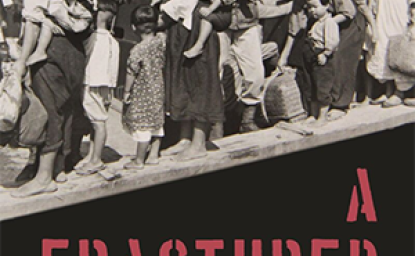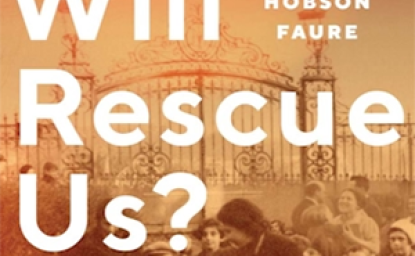163. Determined Histories: Macedonia In The International Arena

Grand narratives of Southeast European history can be objects of suspicion, especially when today's confrontations are traced into the past and dubbed as "ancient hatreds." The careful scholar who deconstructs such presentist approaches, however, faces another problem. Past national distinctiveness, when asserted by collective struggle, is a key asset in current political claims. By maintaining a neutral stance on a nation's history, a scholar may be branded as hostile to that nation.
After declaring independence, Macedonia's national history was questioned, and recognition delayed. In the same period, Macedonia experienced serious economic decline and a significant black economy quickly emerged. Connecting ongoing scholarly ambivalence towards the historical depth of Macedonian identity and the economic woes of the country might seem far-fetched.
However, it should be noted that the ambivalence is in part a product of intensive symbolic aggression by Macedonia's three strongest neighbors, Greece, Yugoslavia, and Bulgaria, which have questioned Macedonia's legitimacy in a variety of ways that fall below the threshold of hostility and can be termed "parapolitical." Yugoslavia continues to refuse to ratify its frontier with Macedonia, and its troops have encroached on the Macedonian side. The Serbian Orthodox church denies Macedonian autocephaly. Bulgaria's continuing official non-recognition of the Macedonian language similarly strikes at a key symbol of national identity. Greek opposition to constitution, flag, and, in the last resort, to the name Macedonia, has been accompanied by the consistent, reported violations of Macedonian airspace by Greek fighter planes.
All three states additionally claim to represent "ethnic brethren" within the republic. Macedonia's Serbs appear in censuses, are politically organized, and are putting up candidates in the next election. Greek and Bulgarian claims to have minorities within Macedonia are perhaps fueled by defensiveness about their own Macedonian minorities, whose existence they deny. Seemingly harmless, the parapolitical activities of these neighboring states nonetheless assault sovereignty and autonomy, especially by contributing to stasis or bewilderment in discussions of affairs outside the region.
Western scholarship and its inclination toward equivocation has a long historical pedigree, going back at least to 1903 and the Ilinden Uprising, the nature of which was disputed at the time, as it is now. In particular, Greek reactions to VMRO, the Internal Macedonian Revolutionary Organization, that sought to set up a republic in Krushevo, demonstrate how petitions regarding historical and ethnographic "fact" can quickly fuel more direct, violent action. By 1904 Greek bands, manned by young men convinced of the justice and sanctity of their cause, were practicing terrorism and violence against the civilian population.
What distinguishes the situation today, giving a new dimension to the "Macedonian Syndrome" described by Myron Weiner, is that in the contemporary game of parapolitics non-state actors can be as powerful as states. Alongside Yugoslav, Greek, and Bulgarian activism should be placed the far more vital issue of Macedonian-Albanian relations. Albania is certainly not in a position to actively pursue the destabilization of Macedonia. Kosovo's moderates, headed by Ibrahim Rugova, are likewise concerned more with their own struggles. Yet tensions emerge, a key point being the confrontation over the unauthorized establishment of an Albanian language university in Tetovo in February 1995, when Macedonian police clashed with Albanian civilians. This incident, and the different analyses of it, reveal some of the complex and interwoven narratives people offer. The Macedonian government emphasized the institution's illegality, Albanian politicians the violence of the police repression. Several accounts suggested shadowy involvement by the Serbian secret police. The main Macedonian nationalist opposition party, VMRO-DPMNE, saw the whole affair as a state-organized demonstration of power, signaling the long-term plan of President Kiro Gligorov and the ruling SDSM party to re-annex Macedonia to Serbia. Serbian sources within Macedonia instead saw the university's attempted foundation as an extension of Kosovar-led militancy to western Macedonia.
This event is part of the ongoing history of Western Macedonia, where, along with sizable populations in Kumanovo and Skopje, the majority of Macedonia's Albanians are concentrated. The number of symbolic or parapolitical confrontations between population and state here is striking--in Pazar in 1992, armed incursions along the Albanian-Macedonian frontier and gun-running scandals in 1993, reported street fights between Macedonians and Albanians in Gostivar, bomb explosions in urban centers within the last nine months, and most recently arrests of Albanian students with alleged links to the Kosovo Liberation Army (KLA).
What such events demand is analysis that moves beyond the partial, over-determined accounts which rely so heavily on ascribing sinister motives to one agency or another. One approach is to seek to connect these events in a history which emphasizes not scheming states, but economic pressures affecting minority populations. With respect to Albanian militancy in Kosovo and Macedonia, no concerted foreign state policy lies behind it. Only recently has any identifiable external agency come to light: as stated above, it appears that the KLA has expanded its activities and aims into Macedonia.
Aleksa Djilas has referred to the KLA as "a blend of terrorist organization, a guerrilla force, and a popular uprising waiting to happen." Committed to violent struggle to gain control of the area in which it operates, it relies on transnational links that extend widely, drawing on an ethnic diaspora for financial support. Its foot soldiers are young, radicalized Albanian men, who since 1989 have been denied access to education or employment in the state of which they are citizens.
In all these respects, the KLA is close kin to the VMRO of 1893-1903, as described by Duncan Perry. A study of the mechanics of VMRO's activism reveals that it depended not only on those who took up arms in 1903, but on a far broader section of the population. Initially, it drew on feelings of political disenfranchisement and economic oppression among the Slavic Christian population of Ottoman Macedonia. Its history from foundation in 1893, revolution in 1903, internal feuding and terrorism through the 1920s, and suppression in the mid 1930s, could fit Djilas's description of the KLA.
Both VMRO and the KLA arise out of specific historical conditions of economic underdevelopment, trans-national migration, and political repression. In the case of VMRO, remittances from abroad and the control of the movement of various types of contraband--most obviously arms but also tobacco and illegal migrant workers--provided the funds that made direct action possible. In 1903, VMRO controlled Western Macedonia as a "state within a state," and its supporters were confident that international intervention would secure their autonomy. In the 1930s, VMRO controlled Western Bulgaria as a fiefdom, interested less in popular support than in maintaining its power and revenues.
This history of interconnection between a national liberation movement, and the transnational--and flows of people, ideas, and (often illegal) commodities--is not one that has been emphasized. The trajectory plotted is not offered as a blueprint for the future of the KLA and the states within which it operates. It offers, nonetheless, one way to get past states and nations as the most significant actors in history and, thus, to move beyond the accusations of equivocation or partiality that await anyone who takes on the claims and counter-claims of national narratives. Small states or nations with fragile economies in areas of cultural diversity may aspire to national sovereignty, but self-determination does not guarantee a stable future. Instead it benefits those non-state organizations that for specific historical reasons can negotiate those boundaries to their own profit. The argument posed here is that a focus, not on the international but on the transnational aspect of Macedonian history, makes this clear.
Comparative historical analysis will not solve Macedonia's problems. But whatever other steps are taken, it is vital to recognize that histories about states in competition repeat themselves, and imposed settlements engender resentment that can endure in collective memories. Histories about common ground and common experiences need not. The kind of histories sketched above, of political movements which arise from parallel circumstances, can perhaps be used to bring opposing sides and schools of scholarship together, and compel recognition of the blend of historical conditions that determine some dimensions of the present. As such, this form of history seems to be a necessary component of scholarly intervention.
Keith Brown spoke at an EES Noon Discussion on September 29, 1998.
Author
Associate Professor (Research), Brown University

Global Europe Program
The Global Europe Program is focused on Europe’s capabilities, and how it engages on critical global issues. We investigate European approaches to critical global issues. We examine Europe’s relations with Russia and Eurasia, China and the Indo-Pacific, the Middle East and Africa. Our initiatives include “Ukraine in Europe”—an examination of what it will take to make Ukraine’s European future a reality. But we also examine the role of NATO, the European Union and the OSCE, Europe’s energy security, transatlantic trade disputes, and challenges to democracy. The Global Europe Program’s staff, scholars-in-residence, and Global Fellows participate in seminars, policy study groups, and international conferences to provide analytical recommendations to policy makers and the media. Read more




